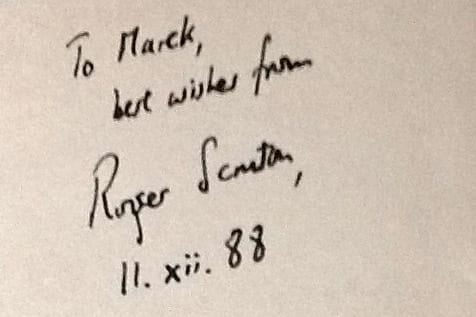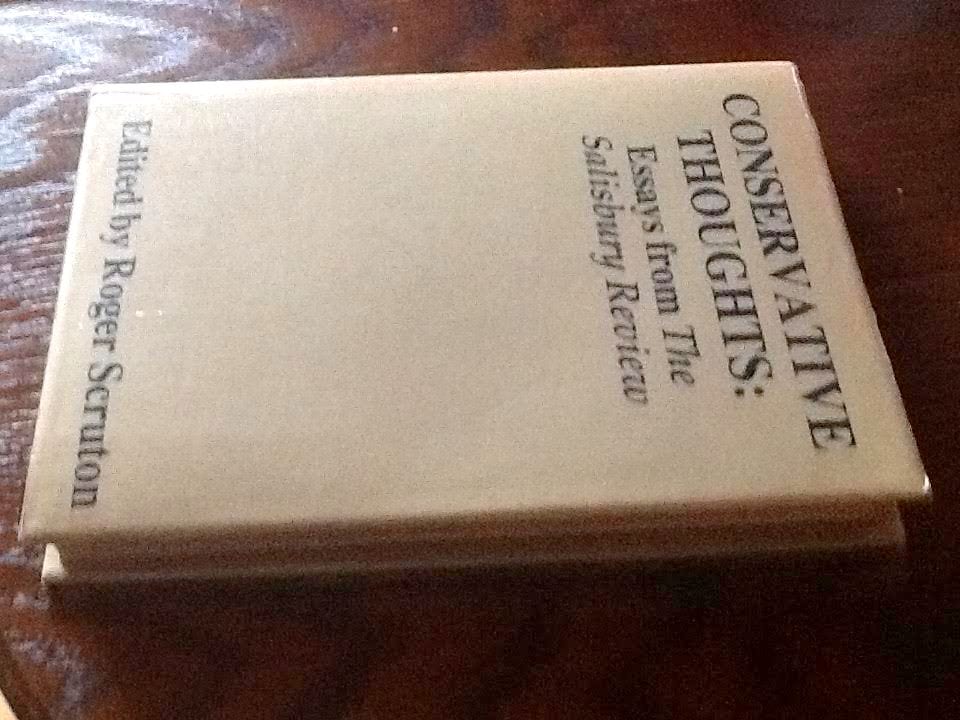The day after being ennobled by the Queen of England, Sir Roger Scruton, one of the most prominent thinkers of our time, received the "Courage and Credibility" medal from the President and the Speaker of the Polish Parliament.
As he himself said at the Poland the Great Project congress: "In the days of anxiety and frustration, the role of the conservative philosopher fell to him. In the early 1980s, together with Baroness Caroline Cox and Jessica Douglas-Home Scruton, he founded the Jagiellonian Trust, an organization that provided Polish conservatives with books, magazines, medical and financial aid. He spread his anti-communist message for Eastern Europe in the pages of The Times and the Salisbury Review, a conservative magazine of which he was founder and editor-in-chief. In those days the support of people like Scruton was invaluable to our region. Poland's reality was unacceptable to him; it was a world from which he wanted to free us. "Poland had been stripped of its identity, which it had retained regardless of the actions of Stalin or Hitler... It was a country shrouded in its own mysterious aura, where I felt the breath of aggression. A country filled with fear, where people spoke in whispers or sat in silence...As I walked, I heard footsteps that quieted as I stood..." - he said.
In the 1980s, he sought out anti-communists in Poland on his own initiative, and engaged scientific and academic circles in the struggle against the regime. Common reflections, among others, on free market economy, formed Polish right wing.
Przemyśl was one of the first cities to shed its grim communist bonds. A group dedicated to philosophical thought made the life of the city free. It was then that Roger Scruton met the editor-in-chief of the "Cultural Attic," an association of philosophers, poets, and cartoonists - the current Speaker of the Sejm, Marek Kuchciński. "With Kuchcinski we built an anti-communist network," Scruton said. In Przemyśl, he led several Attic meetings, including "The Left and Conservatism," "Trade Unions and the Law," and "Principles of Conservative Politics."
During the panel, he recalled: - I became involved in this Polish opposition culture directly influenced by visiting Poland in 1979, right after Pope John Paul II's visit to his homeland. I was very impressed by this atmosphere in Poland - huge tensions, fear, and yet little seeds of hope everywhere. So I thought, if there are seeds of hope here, I should try to water them, so that they can grow. After visiting Poland, I went to Czechoslovakia to give a private seminar to people who were no longer able to teach at the university, and for young people who were gathering around them who were not able to study at the university because of improper social status. And together with some friends, we decided to help these people, that is, to send them what they needed, as well as visiting people to send the message that we had not forgotten them. It was not easy, because it was very difficult to get my colleagues in the universities to cooperate, because they all had leftist views and they didn't think it would be wise to upset the balance of ensuring peace in Europe, the Soviet peace that they wanted to impose on Britain as well. So it was very difficult to continue (in Britain), but, as I discovered, it was much easier, to some extent, here (in Poland). During my visit I went to the Catholic University of Lublin, this last independent university in Eastern Europe, and indeed the only intellectually independent university in Europe. It was the only place in Europe where you could speak in a completely free way about the idea of conservatism. I met this young lecturer there, Mark Matraszek, who, having come from England, had spent a year there and was looking for other English anti-communists around him. So I introduced myself to him as a visiting anti-communist looking for recruits. And he tells me: here's one, offering himself with dedication. So great, I could form a team. Back in England, I found a few more people: Jessica had been a strong opponent of communism all her life and wanted to join and help. So did Caroline Fox and Agnieszka Kolakowska, whose credibility need not be explained in this country. So we set up a small Trust to raise money to send people on visits to people we met here and sympathised (with our views). The idea was to send them to places where there were some (anti-communist) actions, and to provide them with the things they needed to continue those actions: books, discussions, ideas, material for underground publications, some money (though we didn't have much), and in general a British sense of cooperation, which is the most valuable thing our country has. In any critical need, at least the English, but I think to some extent the Scots, work together, form small communities and ventures, trying to solve the problem. That's the most valuable thing we have, and it's the reason why we're still an independent country - or soon, in not many days, we will be. (laughter in the hall) And this value is very valuable for Poland, where you have all the moral values, courage, honesty, but you have to protect one thing - the ability to cooperate. We created a small community in opposition to the communist orthodoxy - through the intellectual world and through small associations - outside the universities - of people interested in the culture and history of their country. We were very fortunate to meet then Marek Kuchciński, who is now - I am pleased to say - the Speaker of the Polish Sejm, and who then invited us to Przemysl, a beautiful and old Central European city which is a center of its own local culture. And through him we started to create a network of contacts that was very valuable to us.
I think we can't, unfortunately anyway, take credit for defeating the communists, because that required a mass social movement. And you had a mass social movement during that period, Solidarity, which was an extraordinary event, and I'm happy to have lived through that extraordinary event. It was the first ever, authentic mass revolution of the working class. It was a rebellion against socialism, not for socialism, and this is a significant denial of the theory of Marxism. We all looked at what happened with awe and wonder, because it changed the world. Of course, everything that happens in Poland remains controversial in Poland, but everywhere else it is not controversial. We are happy that Solidarity existed and that it did what it did. We think it changed history more completely than the Communist Party did before it.(...)
In his speech, after being decorated with the "Courage and Credibility" medal, Roger Scruton recalled in a special way his meetings at the Catholic University of Lublin and in Przemyśl:
- (...) Of all the places where I made friends during those difficult years, two stand out to me as symbols of Polish resistance to communism: The Catholic University of Lublin, which retained its intellectual autonomy during the communist years, and Przemyśl, a city in southeastern Poland that was at the center of many conflicts and where something remained of the old social spirit. Even then there was a discussion group in Przemysl devoted to philosophical and political ideas. Our visits there were enthusiastically welcomed by the participants. We made contacts there with artists, with authors of underground publications, and soon realized that Przemysl was a place that wanted to remain itself despite the grim communist reality. In particular, Marek Kuchcinski played an important role in shaping an authentic civil society in Przemyśl. Like many young Poles of his generation, he saw free market economics and cultural conservatism as inseparable parts of the same (systemic) transformation capable of returning Poland to its history and restoring its national identity. The people who participated in our conversations came from different walks of life, but they were united by pride in their city and resistance to the regime that had stolen it from them. It was especially rewarding for us to see the difference we could make for a small town that was not important to Western journalists, but which made more use of our idea (literally, a lifeline) than any big city. In a provincial town like Przemyśl, where people lived, people denied the official distinction between the whispers of private life and the dictates of public life. The streets were lively and cheerful even at night. You could walk them, as in London, chatting freely with friends, or stand and wait for someone, without drawing attention to yourself or any uniformed figures. Completely different from Warsaw, where there were militia patrols everywhere ready to control the activity of passers-by at any time. It was especially annoying at night.(...)
The philosopher believed that communists must be punished. Unfortunately, it became clear to him that the party would not pay for its own crimes. He himself admitted that the legacy of communism was not understood. The void was filled in Poland by Western forces, and like Margaret Thatcher at the time - today Law and Justice is considered a threat to democracy by Western circles, especially on the left. In opposition to the EU stands Pis's desire to regain a homeland with a sense of security and tradition. The EU is taking away our right to culture and national identity, while Law and Justice wants to preserve this identity. "These kinds of values are coming from outside from bureaucrats and judges who do not live in their own countries, do not share their values, but cling to an international agenda in the name of ill-conceived assumptions," - he argued.
Scruton considers Christianity to be the foundation of our heritage. "I have I hope that once again the Christian tradition, which allowed Poland to preserve its identity in the times of communism, will come to the fore" - he said during the panel.
text/photo Marta Olejnik
From left: Jacek Borzęcki, Speaker of the Sejm Marek Kuchcinski, Sir Roger Scruton, Jan Jarosz, Janusz Czarski




